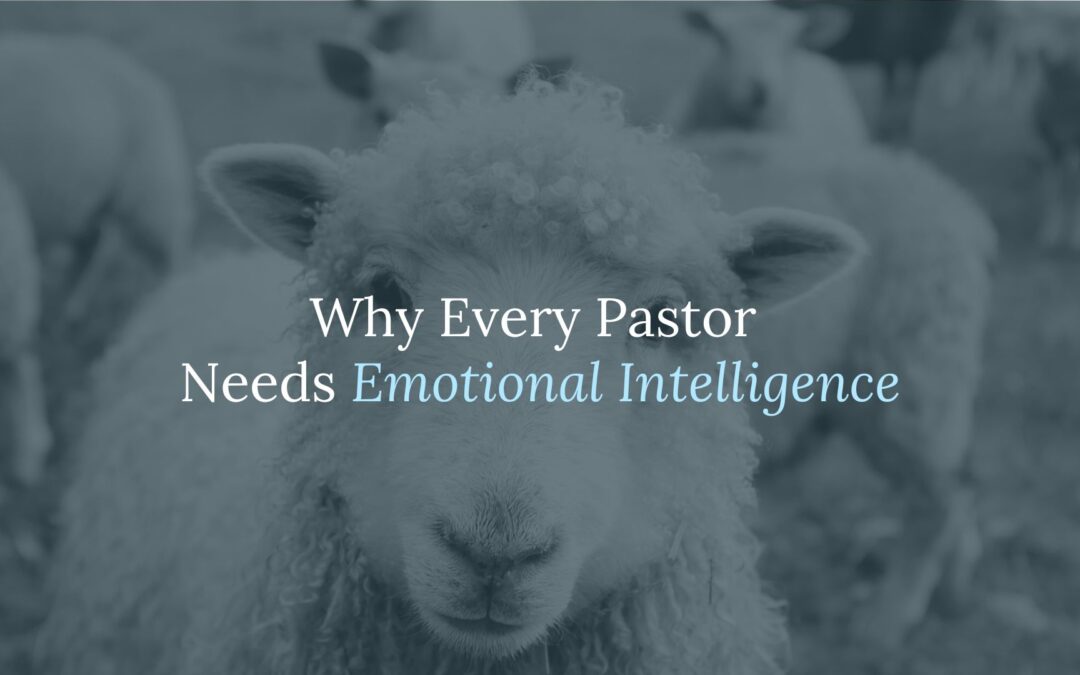Because the Heart Can’t Shepherd What It Can’t See
“Keep watch over yourselves…”
Before Paul says “and all the flock,” he says yourselves.
Acts 20:28 isn’t subtle. And yet, how many of us in ministry have spent years watching the sheep, but not our souls?
We prepare sermons and lead meetings, cast vision and resolve conflict, all while ignoring the emotional dashboard that’s quietly blinking ‘overload.’ Or worse—numb.
And here’s what we know, if we’re honest:
We’ve mastered the art of appearing unshakeable… even when we’re spiritually and emotionally threadbare.
That’s where Emotional Intelligence (EQ) comes in—not as a buzzword, but as a biblical tool.
What Is EQ—and Why Should Pastors Care?
Emotional Intelligence is the ability to recognize, understand, and manage your own emotions—and the emotions of those around you. It isn’t sentimentality. It’s soul-wisdom in real time.
In modern terms, EQ includes five key areas:
- Self-awareness
- Self-regulation
- Motivation
- Empathy
- Social skills
In biblical terms? It bears a strong resemblance to the fruit of the Spirit. It sounds like James: “Be quick to listen, slow to speak, slow to become angry.” It smells like Christ.
The Data Is Clear: EQ Is Ministry Survival Gear
Let me show you just how critical EQ is for pastoral leadership:
- Burnout is on the rise. Over 40% of pastors are now at high risk—up 400% since 2015. But research shows that pastors with high EQ experience far lower burnout across every measure.
- Leadership effectiveness increases. One study of executive pastors showed that EQ alone explained 42% of their perceived effectiveness. That’s nearly half.
- Conflict is handled better. Emotional intelligence equips us not to avoid conflict (a temptation in ministry), but to transform it—through empathy, regulation, and wise timing.
- Job satisfaction and team morale rise. EQ doesn’t just change how you feel—it shapes how your entire staff team functions, collaborates, and grows.
- Christ-like leadership becomes visible. Congregations don’t follow charisma—they follow character. Emotional maturity isn’t optional for a shepherd. It’s essential.
The Gospel Requires a Self-Aware Shepherd
We are not called to be perfect, but we are called to be present—to ourselves, to our people, and to the Lord.
Jesus knew His emotional state. He wept. He grieved. He rejoiced. He questioned in the garden and showed compassion in the crowd. He lived with a holy awareness, even in the midst of anguish. So must we.
As pastors, we are not exempt from the need for emotional growth. We are stewards of it.
To know God more deeply is to know ourselves more clearly—not to obsess over our feelings, but to recognize that unacknowledged emotions don’t disappear; they disciple us in the dark.
Five Questions Every Pastor Should Ask:
- When was the last time I named what I was feeling, without spiritualizing it?
- Do I know how my mood shapes the tone of our meetings or sermons?
- Can I listen to criticism without spiraling or retaliating?
- Do I sense emotional shifts in others, or only react when it’s “too late”?
- Am I modeling emotional maturity for my staff, family, and church body?
This Is Discipleship, Too
Let’s stop calling it “soft skills.” Emotional Intelligence is spiritual formation. It is leadership fidelity. It is how we shepherd hearts, starting with our own.
So, to my fellow pastors and ministry leaders:
Don’t wait for a breakdown to start paying attention to your inner life.
Don’t assume high theology cancels out low awareness.
And don’t believe the lie that burnout is a badge of honor.
Start today. Be honest with yourself. Ask your spouse. Take the Emotional Intelligence assessment. Find a coach. Read the Psalms with fresh eyes—not just for inspiration, but for instruction.
We are not merely sermon-deliverers. We are soul-shepherds.
And the best shepherds know when their own soul needs tending, too.
Let the gospel shape you—emotionally, relationally, and deeply.
Because the health of the church often reflects the health of its shepherd.
And healing always starts with honesty.
“Above all else, guard your heart, for everything you do flows from it.”
— Proverbs 4:23

